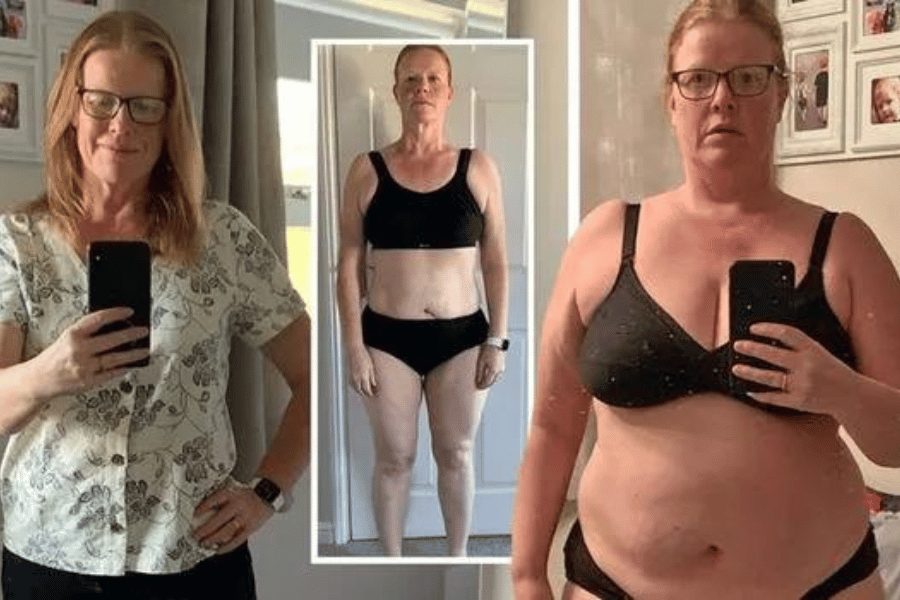
Understanding Menopause and Weight Gain
Menopause, a natural stage in a woman’s life, often comes with significant hormonal changes that can directly impact weight management. During this time, many women experience a shift in their body’s metabolism, leading to an increased propensity for weight gain, particularly around the abdomen. This change is primarily due to a decline in estrogen levels, which can affect how the body distributes fat and utilizes energy.
The importance of finding a best menopause weight loss plan tailored specifically for menopausal women cannot be overstated. Dr. Carol Roberts, a specialist in women’s health, explains, “Menopause brings about metabolic changes, and therefore, a one-size-fits-all approach to weight loss is not effective. Tailoring weight loss plans to address these specific changes is crucial for success.” This personalized approach is essential in addressing the unique challenges faced during menopause.
Moreover, the prevalence of weight gain during menopause is a common concern, affecting a significant portion of women going through this transition. It’s not just a matter of aesthetics but also of health, as weight gain during menopause can increase the risk of various health issues, including heart disease, diabetes, and osteoporosis. Thus, identifying and implementing an effective weight loss plan during menopause is key to maintaining not only physical health but also overall well-being and quality of life.
Exploring the Best Menopause Weight Loss Plan
Nutrition and Diet for Menopausal Weight Loss
A balanced and nutrient-rich diet is paramount for menopausal women looking to manage their weight effectively. The best menopause weight loss plan often includes dietary approaches such as the Mediterranean diet, intermittent fasting, and low-carb options, each tailored to address the unique nutritional needs during menopause.
Mediterranean Diet
The Mediterranean diet, rich in fruits, vegetables, lean proteins, and healthy fats, has been recommended by nutritionists for menopausal weight management. Dr. Olivia Rose, a registered dietitian, notes, “This diet is beneficial due to its anti-inflammatory properties and ability to balance hormones, which can be disrupted during menopause.”
Intermittent Fasting
Intermittent fasting, involving cycles of eating and fasting, can also be an effective approach. A study published in the Journal of Mid-Life Health highlights its benefits in improving metabolic health, a key factor during menopause.
Low-Carb Options
Low-carb diets can help manage insulin levels and may reduce menopausal symptoms. The American Journal of Clinical Nutrition reports that lower carbohydrate intake can be beneficial for weight loss in postmenopausal women.
Exercise and Physical Activity
Regular exercise plays a critical role in managing weight during menopause. It’s not just about burning calories; it’s also about maintaining muscle mass and improving overall health.
Strength Training
Strength training is particularly effective. The National Institute on Aging suggests strength training to preserve muscle mass, which tends to decrease during menopause, consequently slowing down the metabolism.
Yoga and Cardio
Yoga and cardio exercises also offer significant benefits. Yoga can help reduce menopausal symptoms like hot flashes and improve mental health, while cardio exercises are great for heart health and weight management.
Hormone Replacement Therapy (HRT) and Weight Management
Hormone Replacement Therapy (HRT) can be a part of the best menopause weight loss plan, primarily for its potential impact on weight management during menopause.
Benefits and Risks
The benefits and risks of HRT vary from person to person. The North American Menopause Society states that HRT can help with menopausal symptoms, which may indirectly aid in weight management. However, medical supervision is crucial.
Testimonials
Women’s experiences with HRT and weight changes are diverse. Testimonials indicate that while some find HRT helpful in managing weight, others do not see significant changes. It’s important to consult healthcare providers to understand personal risks and benefits.
In conclusion, the best menopause weight loss plan is multi-faceted, combining diet, exercise, and possibly HRT. Each element plays a crucial role in addressing the unique challenges of weight management during menopause. Consulting with healthcare professionals and considering personal health profiles is essential in crafting a plan that is both effective and safe.
Implementing the Best Menopause Weight Loss Plan
Successfully integrating the best menopause weight loss plan into your daily life involves a combination of informed choices, consistency, and a commitment to your health. Here are practical tips and strategies to help you effectively adopt the recommended diet, exercise, and potential HRT for menopausal weight management.
Consult with Healthcare Professionals
Before making any significant changes to your diet or exercise routine, especially when considering Hormone Replacement Therapy (HRT), it’s imperative to consult with healthcare professionals. Dr. Susan Mitchell, a menopause specialist, advises, “Each woman’s body responds differently during menopause, and professional guidance is key in customizing a plan that is safe and effective for you.”
Setting Realistic Goals
Set achievable and realistic weight loss goals. Remember, menopause can affect your body’s response to diet and exercise, so be patient with yourself. Aim for gradual progress rather than rapid changes.
Diet and Nutrition
Implement dietary changes gradually. If you’re exploring a Mediterranean diet, start by introducing more fruits, vegetables, and whole grains into your meals. For intermittent fasting or low-carb options, begin by reducing your intake of processed foods and sugars.
Exercise Routine
Incorporate a mix of strength training, yoga, and cardiovascular exercises into your weekly routine. Start with exercises you enjoy, as this will help you stay consistent. For instance, if you prefer yoga, begin with gentle sessions and gradually include strength training exercises.
Track Your Progress
Keep a journal or use apps to track your dietary intake, exercise routines, and overall progress. This will not only help you stay on track but also allow you to adjust your plan based on your body’s response.
Incorporating HRT
If you decide to go for HRT, closely monitor your body’s response to the therapy. Keep regular appointments with your healthcare provider to discuss any changes or side effects you experience.
Stay Informed and Flexible
Stay updated with the latest research and findings related to menopause and weight loss. Be flexible in adapting your plan as you progress, based on what works best for your body.
Support Network
Build a support network with friends, family, or support groups. Sharing experiences and tips can be incredibly motivating.
Implementing the best menopause weight loss plan requires a holistic approach, considering your unique physical and emotional needs during menopause. By following these steps and working closely with healthcare professionals, you can effectively manage your weight and enjoy a healthier, more balanced lifestyle during and beyond menopause.

Conclusion
As we conclude our exploration of the best menopause weight loss plan, it’s evident that a holistic approach is essential for success. We’ve delved into the importance of a balanced diet, including options like the Mediterranean diet, intermittent fasting, and low-carb diets, all tailored to the unique needs of menopausal women. Alongside diet, we emphasized the vital role of regular exercise, such as strength training, yoga, and cardio, and discussed the potential benefits and considerations of Hormone Replacement Therapy (HRT).
This journey through menopausal weight loss is not just about shedding pounds but about embracing a healthier lifestyle that enhances overall well-being. As you consider these insights, we invite you to reflect on how these strategies resonate with your personal health goals. Are there aspects of this plan that you find particularly compelling or suited to your needs?
In closing, remember that navigating menopausal weight loss successfully is within reach. With the right tools, knowledge, and a personalized approach, you can maintain your health and well-being during this significant life stage. We hope this guide has sparked your interest and empowered you with valuable information to embark on a healthier, more balanced menopausal journey.
Addressing Key Concerns: Your Menopause Weight Loss Plan Questions Answered
In this section, we aim to address some of the most common questions and concerns related to the best menopause weight loss plan. Our goal is to provide you with practical and evidence-based answers to assist in your journey towards a healthier you during menopause.
Q1: How safe are diet and exercise routines during menopause?
A: Most diet and exercise routines, if well-balanced and tailored to your individual health status, are safe during menopause. However, it is essential to consult with healthcare professionals, especially if you have any underlying health conditions. Moderate exercise and a nutrient-rich diet are generally recommended.
Q2: What are the potential side effects of Hormone Replacement Therapy (HRT) in a weight loss plan?
A: HRT can have side effects such as nausea, breast tenderness, and mood swings. In terms of weight, some women may experience slight weight gain initially, although this is typically temporary. It’s important to discuss with your doctor the benefits and risks of HRT in the context of your overall health and weight loss goals.
Q3: Are there effective strategies for overcoming weight loss plateaus during menopause?
A: Overcoming plateaus can be challenging but achievable. Strategies include varying your exercise routine, ensuring your diet is balanced and calorie-appropriate, and managing stress and sleep, which can significantly impact weight. Sometimes, consulting a dietitian or a fitness expert can provide new insights and personalized strategies.
Q4: How do I adjust my weight loss plan as I progress through menopause?
A: As your body changes, so too should your weight loss plan. Regularly assess your progress and be willing to make adjustments. This might mean altering your diet as your metabolism changes or introducing different types of exercises as your body’s needs evolve.
Q5: What role does mental health play in menopausal weight loss?
A: Mental health significantly impacts physical health, especially during menopause. Stress, anxiety, and depression can all affect eating habits and motivation to exercise. Prioritizing mental health through practices like mindfulness, adequate sleep, and seeking professional help when necessary is crucial.
Q6: Can natural supplements aid in weight loss during menopause?
A: Some natural supplements may aid in weight loss or alleviate menopausal symptoms, but their effectiveness varies. It is essential to approach supplements with caution and consult with a healthcare provider before starting any new supplement regimen.
Related Posts :
- En How Celebrities Optimize Weight Loss With Pro Keto Acv Gummies Rc27
- Unlock The Power Of ACV BHB Gummies Pure Brilliance A Comprehensive Review And Guide A4zt
- En Health Benefits Can You Lose Weight By Drinking Apple Cider Vinegar Q1x8
- The Pros And Cons Of Keto ACV Gummies A Comprehensive Guide To The Rapid Lean Keto ACV Gummies Revo Jq09
- En Unveiling The Benefits Does Apple Cider Vinegar Pills Help You Lose Weight Ma3b

